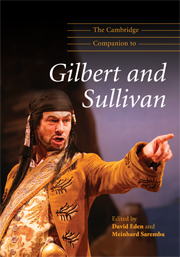Book contents
- Frontmatter
- Part I Background
- Part II Focus
- 5 The operas in context: stylistic elements – the Savoy and beyond
- 6 The librettos in context: Gilbert's ‘fables in song’
- 7 ‘This particularly rapid, unintelligible patter’: patter songs and the word–music relationship
- 8 Standing still and moving forward: The Mikado, Haddon Hall and concepts of time in the Savoy operas
- 9 Musical contexts I: motives and methods in Sullivan's allusions
- 10 Musical contexts II: characterisation and emotion in the Savoy operas
- Part III Reception
- Part IV Into the twenty-first century
- Appendix 1 Who wrote the overtures?
- Appendix 2 Stage and choral works by Arthur Sullivan and W. S. Gilbert
- Appendix 3 Modern editions of works by Arthur Sullivan and W. S. Gilbert
- Appendix 4 Sullivan's archetypes of English opera
- Notes
- Bibliography and further reading
- Index
- Plate section
5 - The operas in context: stylistic elements – the Savoy and beyond
from Part II - Focus
Published online by Cambridge University Press: 28 September 2011
- Frontmatter
- Part I Background
- Part II Focus
- 5 The operas in context: stylistic elements – the Savoy and beyond
- 6 The librettos in context: Gilbert's ‘fables in song’
- 7 ‘This particularly rapid, unintelligible patter’: patter songs and the word–music relationship
- 8 Standing still and moving forward: The Mikado, Haddon Hall and concepts of time in the Savoy operas
- 9 Musical contexts I: motives and methods in Sullivan's allusions
- 10 Musical contexts II: characterisation and emotion in the Savoy operas
- Part III Reception
- Part IV Into the twenty-first century
- Appendix 1 Who wrote the overtures?
- Appendix 2 Stage and choral works by Arthur Sullivan and W. S. Gilbert
- Appendix 3 Modern editions of works by Arthur Sullivan and W. S. Gilbert
- Appendix 4 Sullivan's archetypes of English opera
- Notes
- Bibliography and further reading
- Index
- Plate section
Summary
A study of the correlation between the so-called Savoy operas and Sullivan's other major works seems at first glance a non-controversial subject of musicological inquiry. Sullivan was by no means unique in writing works that succeeded on the popular stage and in the concert hall. Elgar and Copland are highly respected composers who wrote popular marches or ballets in addition to symphonies and concertos. Leonard Bernstein is famous – aside from his great conducting career – as the composer of West Side Story, but Age of Anxiety, Jeremiah or Chichester Psalms are not proscribed because of his Broadway popularity. George Gershwin wrote popular songs and Broadway musicals. He also wrote concert works and the great American opera. His reputation in both fields is exemplary.
Sullivan's comic operas and serious works were frequently performed during his lifetime. After his death in 1900, the comic operas retained enormous popularity, while the concert works gradually sank into oblivion. Very early acoustic recordings were made of The Yeomen of the Guard and HMS Pinafore in addition to extensive excerpts from The Golden Legend and Ivanhoe. World War I precipitated the collapse of the Victorian–Edwardian world order – the society of which he was a distinguished member – thus terminating Sullivan's reputation as a great composer. Only in those works that stood aside from – indeed parodied – that now discredited sociopolitical system did Sullivan's music live on as a vital force.
Information
- Type
- Chapter
- Information
- The Cambridge Companion to Gilbert and Sullivan , pp. 67 - 84Publisher: Cambridge University PressPrint publication year: 2009
